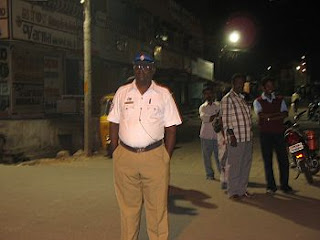November 13th: Sri Pidari Urchavam, Night, Sri Pidariamman on Lion Vahanam
November 14th: Sri Vinayagar Urchavam, Night, Sri Vinayagar on Mooshiga Vahanam
* (Urchavam = Tamil word for temple festivals)
* (Kamadenu = wish fulfilling cow)
* (Vahanam = vehicle, seat)
* (Mooshiga = mouse)
Yesterday evening I performed giripradakshina around Arunachala and coming back through the town of Tiruvannamalai (during my hillround) I was able to enjoy the first night of Deepam Festival, namely, Sri Durgambal Urchavam.
The Deepam festival involves a lot more than just the lighting of the flame on top of Arunachala. The first night of the lighting of the flame actually takes place on the 10th day of Deepam and stays alight for between 8-10 days. However the Festival itself lasts for 13 days. Of these the first day is connected with the Durga Amman Temple. Each day denotes different functions and ceremonies at either the Durga Temple, the Annamalai Temple or in the streets surrounding them.
Deepam is a festival which traditionally is connected with the Hill and Arunachaleswarar Temple and Durga Amman Koil (Koil = Temple), is the only other Arunachala Temple that actually participates in the functions.
The reason for this is supposed to be because of the Goddess and the demon Mahisha (see 'The Fight with Mahishasura'). Before her battle the Goddess appointed four noble Bhairavis (celestial damsels) to keep watch on all four sides of Arunagiri. She ordered:
"Admit only those who have come to worship Arunachala and are tired, hungry and thirsty. Others should not enter. She then appointed strong men to guard the boundaries of Arunachala and continued Her penace at Her ashram." [The Glory of Arunachala]
For this reason, the first day of Deepam Festival is always a celebration of the Goddess, recognised as a Guardian of Arunachala.
The below sequence of photographs shows the procession of the Durga Statue seated on Kamadhenu (the wish fulfilling cow) and being taken on a clockwise procession from Durga Amman Temple around the perimeter streets of the 26 acre Arunachaleswarar Temple and thereafter returning back to her own Temple. As is always the case in such functions, the procession stops whenever people along the route make offerings.
This year 4 large screens have been installed around the Temple, and one giant screen inside, so that later days of the Festival can be seen by the greatest number of devotees.


The procession through the town plays a very important role in maintaining a living relationship with the ordinary folk going about their business throughout the day, who sometimes may not have sufficient opportunities to attend functions inside the Temple itself.

And in the below photograph, the Goddess seated on Kamadhenu, the cow.

The peacock feather, which is positioned just above the cows tail, denotes auspiciousness.

Here we are at the front of the Big Temple. The decorations have already been put up, and hopefully one evening I will climb part of the Hill to take nice photographs of just how beautiful the brightly lit Temple looks.

While accompanying the Goddess procession, I also took some wonderful photographs of the huge chariot - which will be used later during Deepam. You can get an idea of its size by noticing the man in front of the huge wooden wheels.

As we passed near the flower market, I noticed some cows scavenging through the debris and discarded flower garlands.

In the next photograph, the chariot has halted so that a devotee may present their offering to the priest to be offered up to the Goddess in the appropriate fashion.

And next the glorious Goddess.



I'm ready to make my way home so I have a quick chat with the friendly policeman helping with the procession and proceed homeward after a beautiful and inspirational evening.



Sounds (and looks) like it is getting more and more busy & exciting there! :-)
ReplyDeleteExciting and BUSY too!
ReplyDelete